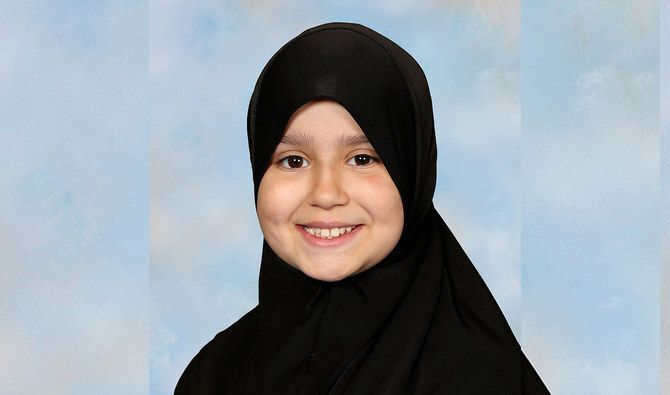LONDON: The body of a 10-year-old British-Pakistani girl whose death sparked an international manhunt was found with burn marks believed to have been made by an iron, a prosecutor told a London court on Monday.
Sara Sharif was found dead in bed at her family home in Woking, southern England, on August 10, 2023.
The discovery triggered a manhunt in which Interpol and Britain’s foreign ministry coordinated with authorities in Pakistan.
The day before Sara’s body was found, her father, 42-year-old taxi driver Urfan Sharif, step-mother Beinash Batool, 30, and uncle Faisal Malik, 29, left the UK for Pakistan with Sharif’s five other children.
All three adults are on trial for her murder.
A post-mortem examination found “signs of traumatic head injury,” apparent scald burns on the inside of her ankles and bite marks — five to her left lower arm and one to her inner thigh — that were “probably human.”
Sara’s stepmother Batool has refused to provide a dental impression for comparison with the bite marks, the prosecutor said.
Other injuries included to Sara’s ribs, shoulder blades, fingers and 11 separate fractures to the spine, he added.
The jury was played a recording of a “calm” phone call on the evening of August 8, 2023, in which Batool asks about booking flights to Islamabad.
Sara’s body was found in the family’s empty house after an emergency call, apparently from Pakistan, alerting officers was made by a man identifying himself as the father.
A note from her father found next to her body appeared to contain a confession, the prosecutor told jurors.
“Love you Sara,” said the note, which was shown to the jury.
A second page added: “Whoever see this note its me Urfan Sharif who killed my daughter by beating.
“I am running away because I am scared but I promise that I will hand over myself and take punishment.”
Another page read: “I swear to God that my intention was not to kill her but I lost it.”
A handwriting expert who analyzed the note concluded it was written by Urfan Sharif.
The three defendants — arrested in September last year after disembarking from a flight from Dubai — all deny murder and causing or allowing the death of a child.














